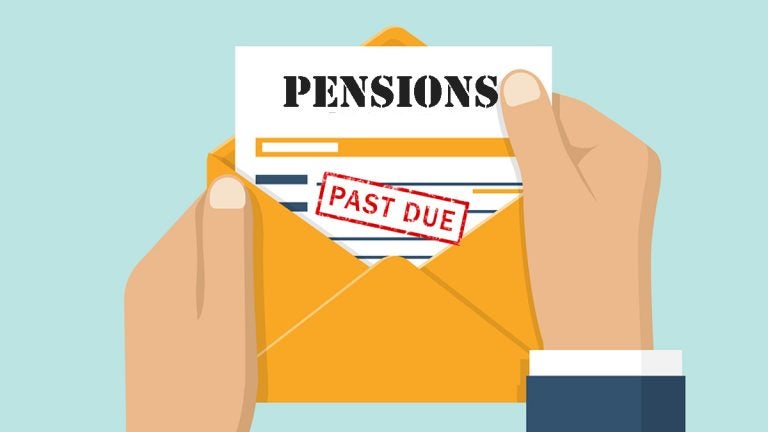Dear New Jersey, your bill is past due

(Image by Alan Tu)

(Editor’s note: This essay was originally published on Jan 11. 2016 on NJ Spotlight)
In the debate over whether New Jersey should pass a ballot question this year to require the state to fulfill its obligation to fund public-worker pensions, the answer to one extremely important question has been spun by politicians in a variety of directions: What happens if the state continues to follow Gov. Chris Christie’s current path and doesn’t pay the required amount and lets the pension funds run out money? Keep in mind that actuaries agree this will begin to happen in six short years when the PERS pension system hits its depletion date in 2022.
The answer to this crucial question has been miscategorized by Christie and others on numerous occasions for political reasons in order to leverage the Legislature and workers into further givebacks. The legal reality, of course, is much different. Christie has gone so far as to state in last year’s budget address that New Jersey can “no longer afford defined benefit pension systems. It bankrupted Detroit, it bankrupted General Motors, and it will bankrupt us.” We will hear more about this in his State of the State speech, I’m sure, where he will most likely continue to demagogue “irresponsible unions.”
Gov. Christie, a licensed lawyer and former U.S Attorney, knows this is a false comparison. But its sounds good and it’s really scary to hear, so why not tell a little white lie to get the point across?
I’ve been fortunate to represent public-pension systems for more than 39 years in 20 different states, including New Jersey. Currently, I represent the board of trustees for the three largest pension funds in the state, and I argued the recent pension case before the New Jersey state Supreme Court in June. I also was the fiduciary counsel to Detroit’s pension fund during its bankruptcy. I mention this only to illustrate that I’ve been down this road before, and it doesn’t lead anywhere near where the governor says it does. Here are the reasons why:
In the 2015 case Burgos v. State of New Jersey, the Supreme Court ruled that the state’s current pension obligations must be paid. There is no getting around the bill; it must be paid. Pensions are deferred compensation that has been earned, and no amount of political spin will erase the bill. The justices also ruled that employees have a contractual right to receive their pensions. The reason the Christie administration hailed the decision as a victory is because the court ruled that the constitution’s debt-limitations clause limited the court’s ability to extract full payments immediately. This got Christie off the hook, but not the state. The fact remains that in the long run the debt must be paid.
Secondly, states cannot go bankrupt. Federal law allows municipalities like Detroit to declare bankruptcy, as well as corporations like General Motors, which are governed by private-sector law. The State of New Jersey, however, is a public entity. Comparing our state to a local government or private corporation is disingenuous, which Christie knows.
Knowing these two facts — that the state must pay the bills it has accrued and that the state cannot go bankrupt — the logical question remains: If the pension funds run out of money, then what?
The reality is that the state is on the hook. The state Legislature and governor will be forced by the courts to make the payments from the general fund on a yearly pay-as-you-go basis.
But here is the reason taxpayers should be outraged by this financial mismanagement. By continuing to skip or reduce payments now, as has been done over the last 15 budget cycles by both Democratic and Republican administrations, our pension bill is growing exponentially because it is not accruing investment returns on these missed payments.
To put this in perspective, Gov. Christie has failed to make $17.5 billion in required pension payments since taking office in 2010, including payments mandated by the pension-reform law he himself championed — then subsequently walked away from. After Christie’s second term expires and he is long gone from the State House, taxpayers will have to pay $3 for every $1 he skipped. The current tab for this fiscal irresponsibility: $52.5 billion. And unless the State lives up to its responsibility immediately, it’s only going to continue to grow.
The Legislature is attempting to correct this by placing the pension question on the ballot for this year. For New Jersey taxpayers’ sake, I hope it passes. (Editor’s note: Since this essay was published in Janaury 2016 the pension question did not make it out of the Legislature)
Robert D. Klausner is an attorney specializing in public sector pension and benefits law at the Florida-based law firm of Klausner, Kaufman, Jensen & Levinson.
___________________________________________________________
NJ Spotlight, an independent online news service on issues critical to New Jersey, makes its in-depth reporting available to NewsWorks.
WHYY is your source for fact-based, in-depth journalism and information. As a nonprofit organization, we rely on financial support from readers like you. Please give today.




